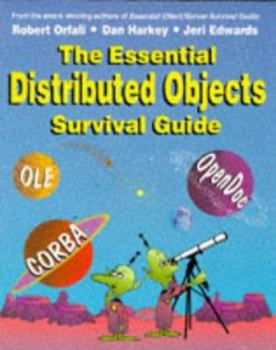The Essential Distributed Objects Survival Guide
Winner! 1996 Software Development/Jolt Productivity Award! "The first clear roadmap to commercial-grade object-oriented systems that many have been waiting for." -Tibbets and Bernstein, Information Week "A worthy sequel to The Essential Client/Server Survival Guide. It frames the CORBA and OLE/COM debate in ways useful to anyone curious about the technical underpinnings of a global computing fabric." -Jon Udell, Byte "Chock-full of useful information." -Mark Betz, Windows Tech Journal This is your best source to help you make intelligent decisions about distributed objects, component technologies, and their standards. Bestselling authors Orfali, Harkey, and Edwards combine detailed technical explanations with their unique brand of offbeat humor-using clever cartoons, controversial soapboxes, and witty quotes. You'll get the full story on distributed objects, including: * What CORBA 2.0 and OLE/COM can do, and how they differ * How distributed objects, components, and client/server come together * Detailed coverage of object frameworks, component suites, business objects, compound documents, and TP monitors * The inside scoop on key products like SOM, Orbix, ObjectBroker, Newi, and DOE Visit our web page at www.wiley.com/compbooks/
Format:Paperback
Language:English
ISBN:0471129933
ISBN13:9780471129936
Release Date:September 1995
Publisher:Wiley
Length:640 Pages
Weight:2.45 lbs.
Dimensions:1.2" x 7.4" x 9.3"
Related Subjects
Business & Management Client-Server Systems Computer Science Computers Computers & Technology Data in the Enterprise Information Systems Manager's Guides to Computing Mathematics Networking Networks, Protocols & APIs Object-Oriented Design Object-Oriented Software Design Science & Math Software Software Design, Testing & Engineering Software EngineeringCustomer Reviews
4 ratings
Distributed Computing is like Childs Play
Published by Thriftbooks.com User , 24 years ago
Hi friends, I am an E-commerce consultant in silicon valley , I can say only one thing about this book - This is a terrific book.
The bible of distributed objects
Published by Thriftbooks.com User , 27 years ago
Orfali, Harkey & Edwards are some of the most influential leaders in the distributed object field. This book is highly readable, and does something that few comprehensive books do: present the technologies in a sufficient manner for both managers and programmers. Their biases are very clear throughout the book: they're rooting for CORBA/OpenDoc.. Which reflects the age of the book. Unfortunately OpenDoc looks to be lost, while CORBA continues to still be used by industry. They treat OLE (ActiveX) like a second-class component model. (It's up to you to decide if it really is :) However, this book will get you "there" faster than any other, with good sprinkles of Oliver Sims' Business Object work, and Taligent's Commonpoint technology (the concept of which may become our future computer user-interface..) A Must read!
Good intro to CORBA, but info on OLE is outdated.
Published by Thriftbooks.com User , 27 years ago
First, this book is based upon information prior to August 1995. (There is a reference in the book to something that is to happen by August 1995.) The 1996 publish date is (IMHO) somewhat misleading. Their treatment of OLE/COM is partisan, but probably valid as of the date it was written. (See Understanding ActiveX and OLE for more current information.) Apparently Micro$oft agreed with some of the authors' objections, since some of the more objectionable parts of OLE have been changed. For example, ODL is out; enhanced IDL is in. All in all, it's a very good intro to CORBA/OpenDoc for people unfamiliar with the nonproprietary industry standard for distributed objects (like me). I'm glad I bought it, but I am searching for a better description of whatever it is in CORBA/OpenDoc that corresponds to Custom Controls (now known as ActiveX controls). Maybe I'm dense, but I missed it. I read this book after having read Understanding ActiveX and OLE. I'm glad I read these books in that order; I would have been mightily confused about OLE if my introduction to it was via The Essential Distributed Objects Survival Guide.
Why distributed objects are important; competing approaches
Published by Thriftbooks.com User , 28 years ago
Your company's choice of middleware that distributes server objects across a network will dictate the flexibility of your code base for years to come. Orfali, Edwards, and Harkey do a great job of explaining the issues involved with distributed objects and the competing solutions. TEDOSG (this industry needs a few more acronyms) contains three sections: background on distributed objects, including what features are important in an "object bus"; the OMG's open approach, including CORBA; and Microsoft's approach using OLE (now DOLE, I believe, for Distributed OLE). This book is very readable, although the technological issues are stupendous and not always easy to keep track of. It is very well produced, with great sidebars and illustrations.






